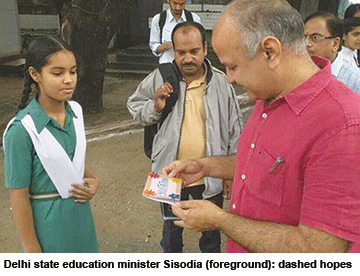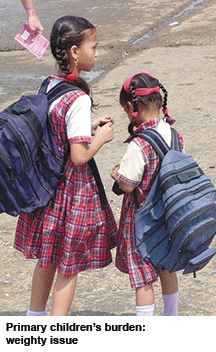Delhi: RTE Act imbroglio
 With an education budget of Rs.10,690 crore in fiscal 2016-17, the highest ever allocated by any government of Delhi state which includes the national capital, the Aam Aadmi Party (AAP) government — elected to power in February 2015 with a sweeping majority — raised hopes of radical changes in Delhi’s 924 government schools. Unfortunately, the AAP government has conspicuously failed to bring about the promised change in the state’s public education system. On the contrary, the Delhi high court has admitted a PIL (public interest litigation) writ against an education programme of the state government’s Directorate of Education titled Chunauti (‘Challenge’) 2018.
With an education budget of Rs.10,690 crore in fiscal 2016-17, the highest ever allocated by any government of Delhi state which includes the national capital, the Aam Aadmi Party (AAP) government — elected to power in February 2015 with a sweeping majority — raised hopes of radical changes in Delhi’s 924 government schools. Unfortunately, the AAP government has conspicuously failed to bring about the promised change in the state’s public education system. On the contrary, the Delhi high court has admitted a PIL (public interest litigation) writ against an education programme of the state government’s Directorate of Education titled Chunauti (‘Challenge’) 2018.
Chunauti 2018 was launched on June 29 to test and support students of classes VI-IX to improve the rock-bottom pass percentage of government school children, half of whom fail the school-leaving class X exam of the Central Board of Secondary Education (CBSE). “The idea behind Chunauti 2018 is that by the year 2018, all students enrolled in class IX in the academic year 2016-2017, regardless of their learning levels at this point, will be trained and mentored to successfully appear for class X examinations in 2018. No child will be left behind,” said Manish Sisodia, state minister for education and deputy chief minister of Delhi, speaking on the occasion.
However, the Delhi-based think tank Centre for Civil Society (estb.1997), which is a champion of education causes and school choice in particular, has filed a writ petition (Centre for Civil Society vs. Directorate of Education and Ors (W.P.(c) 7949/2016) questioning why the Chunauti 2018 programme is limited to children in classes VI-IX and ignores students in the state government’s primary schools in which learning outcomes are abysmal and the dropouts percentage is 25-30 percent. Admitting the petition, a two-judge bench of the Delhi high court has issued notices to the three Delhi municipal corporations (north, south and east) to respond by November 28.
“Assessments only for middle classes while leaving out primary classes is against the letter and spirit of the Act (i.e, the Right of Children to Free and Compulsory Education Act, 2009), since as per the Act, government must ensure learning outcomes for all children up to class VIII in government schools,” says the CCS petition which has prayed for the inclusion of primary classes of all state and local government schools in the Chunauti 2018 programme.
“The ‘no detention’ provision in the RTE Act (s.16) has been misconstrued by government school managements and teachers as no testing or assessment. Teachers in government schools have completely ignored assessment of the learning outcomes of class I-VI children resulting in increase in failures in class IX with students not even attaining basic learning levels,” says Amit Chandra, associate director (policy advisory) of CCS.
The consequence of this blindspot of government school managements and teachers is highlighted by the Chunauti 2018 programme itself. An assessment by the education ministry indicates that 74 percent of class VI children cannot read and grasp simple paragraphs in Hindi textbooks. Likewise an Urban Wards Survey 2014 conducted by the highly-respected Mumbai-based education NGO Pratham in Delhi, indicates that 62 percent of students in classes VI-VIII in government schools cannot read a sentence in English and 72 percent cannot do basic division sums.
Quite obviously the landmark RTE Act, 2009, drafted by legal eagle Kapil Sibal who was Union HRD minister of the scandals-ridden and unlamented Congress-led UPA-II government, has turned out to be a pandora’s box of evils. Because of its several ill-conceived provisions — s.12 (1) (c) (admission of poor children into private schools; s.16 (no detention until class IX) and s.19 (infrastructure norms for private schools) — the country’s already over-burdened courts of justice are being further taxed by a flood of RTE writs.
Swati Roy (Delhi)
Unresolved burden
India’s largest pan-india school examinations board, the Central Board of Secondary Education (CBSE) which has 17,500 affiliated schools in India and abroad, has finally taken a call on the issue of weighty school bags ‘shouldered’ by 200 million plus students to school and back. In an advisory circular dated September 12 to affiliated schools, the Delhi-based exam board has suggested ways and means to reduce the burden of school bags through school, teacher and parent initiatives.
In the circular, CBSE has asked school managements to highlight and generate awareness about health complications likely to be caused by heavy books-filled school bags. In a major relief for lower primary (class I-II) children, the board has advised managements of affiliated schools against assigning any homework to obviate the need for them to carry books to and from school.
The issue of overweight school bags has been discussed and debated for decades. Way back in 1986, the late renowned novelist R.K. Narayan (1906-2001), a nominated member of the Rajya Sabha, commented on this issue in his maiden speech in Parliament: “My heart bleeds whenever I see young boys and girls going to school laden with books which they could hardly carry. This burden does not improve their minds; it only makes them hunchbacks,” he said.
The extent of this problem which is a nationwide phenomenon is confirmed by an Assocham survey released ahead of Teachers’ Day last month. According to the survey, 68 percent of children aged between 7-13 suffer risk of backaches and other related problems, because of the heavy load of books and sports kits. The survey has singled out private schools, whose student bags are heavier than of government and Kendriya Vidyalaya (model Central government) schools.
The CBSE circular warns that the spines of young children are most susceptible to back muscle and shoulder pain, which could cause distortion of the spinal cord or shoulders. “Schools can play a significant role by sensitising students, parents and teachers,” says the circular and advises them to introduce measures to reduce the weight of school bags.
For instance, the CBSE guidelines advise teachers not to punish students for not carrying text or work books to class, and to encourage children to share textbooks. “Teachers may be asked to use loose sheets for workbooks as it reduces the weight of school bags. They may also be encouraged to use alternative methods of teaching based on ICT (information communication technologies) to alleviate the dependence on textbooks,” says the circular.
Surprisingly, the CBSE circular is silent about the most obvious solution — provision of lockers in the school for storage of books and sports equipment which is commonplace in schools in developed OECD countries. With classroom sizes averaging 40 and huge numbers of students crammed into small campuses, especially in metropolitan cities, provision of private lockers — and buildings to house them — is likely to prove an expensive proposition.
“Unfortunately, the issue hasn’t got the attention it deserves. It calls for careful timetabling, reducing the number of books and notebooks, provision for storing books in schools, and encouraging IT-based learning. But for a start, every school should adopt the suggestions made by the CBSE,” says Ashok Pandey, chairperson of the National Progressive Schools Conference (NPSC, a group of 120 elite CBSE-affiliated schools) and principal, Ahlcon International School, Delhi,
Quite obviously, the best solution for reducing the back-breaking weight of heavy school bags for the country’s suffering (day schools) children is provision of lockers in schools. But this will necessarily raise the tuition fees of private schools, anathema for India’s great middle class weaned on unmerited subsidies.
Autar Nehru (Delhi)















Add comment